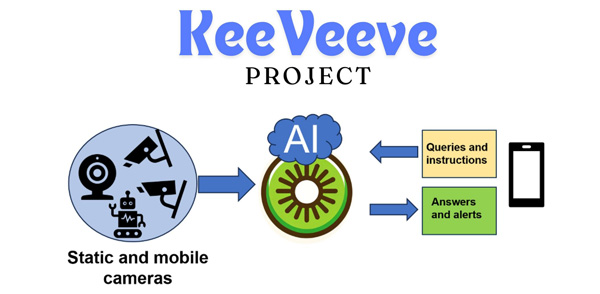
Columbia University’s Department of Electrical Engineering proudly celebrates the achievements of Ph.D. students Mahshid Ghasemi (advised by Prof. Gil Zussman and Prof. Javad Ghaderi) and Jeremy Allen Johnston (advised by Prof. Xiaodong Wang), who have recently been awarded CS3 Accelerator program top honors at the CS3 Innovation Summit. Their work builds on extensive experimentation that was done in the COSMOS testbed in the area of smart cities and video analytics.
Columbia University’s Department of Electrical Engineering proudly celebrates the achievements of Ph.D. students Mahshid Ghasemi (advised by Prof. Gil Zussman and Prof. Javad Ghaderi) and Jeremy Allen Johnston (advised by Prof. Xiaodong Wang), who have recently been awarded NSF Center for Smart StreetScapes (CS3) Engineering Research Center (ERC) Accelerator program top honors at the CS3 Innovation Summit. Their groundbreaking work on the KeeVeeve project, which focuses on next-generation security and safety solutions, earned them the prestigious Ignition Award.
Mahshid Ghasemi
Mahshid Ghasemi is a Ph.D. student in the Department of Electrical Engineering at Columbia University. She is a member of the Wireless & Mobile Networking (Wim.Net) lab directed by Prof. Gil Zussman. She is also co-advised by Prof. Javad Ghaderi. Ghasemi graduated with a B.Sc. degree in Electrical Engineering and a Minor in Computer Science from Sharif University of Technology in Feb. 2019. Her research focuses on edge/cloud video analytics applications and their performance optimizations. Specifically, her work revolves around developing efficient and scalable systems that can effectively manage large-scale video analytics workflows in real time. She actively contributes to the COSMOS Smart Cities and the Digital Twin of New York City projects.
Jeremy Allen Johnston
Jeremy is a PhD student in the Department of Electrical Engineering at Columbia University, advised by Prof. Xiaodong Wang. He received a B.S. in Electrical Engineering from the University of Florida in 2018. His research applies deep learning techniques to problems in radar, and wireless communications, including imaging and beamforming, and quantum sensing.
KeeVeeve: Revolutionizing Security Systems
KeeVeeve, the brainchild of Ghasemi and Johnston, addresses a critical gap in contemporary security systems. Unlike traditional systems that can only detect objects, colors, and motion, KeeVeeve employs advanced behavior analysis and context detection to identify early signs of security threats. This innovative solution provides real-time context understanding, enabling swift risk assessments and prompt notifications to security personnel. KeeVeeve’s intuitive chat interface and fast search capabilities make it a comprehensive tool for modern security needs. KeeVeeve builds on extensive experimentation that was done in the COSMOS testbed in the area of smart cities and video analytics
CS3 Innovation Summit Success
The CS3 Innovation Summit, held on April 16 at Columbia University, showcased the exceptional talents of the VALIDATE Accelerator’s inaugural cohort. KeeVeeve emerged as one of the top recipients of the Spring 2024 Ignition Awards, receiving $10,000 to further their project. This accolade reflects the team’s remarkable progress and potential for significant impact in the field of smart cities and security.
The recognition from CS3 provides Ghasemi, Johnston and the KeeVeeve team with the resources to continue their innovative work. The funds will be used for continued validation, customer discovery activities, and prototype development, deepening their engagement with the smart cities ecosystem. As the VALIDATE Accelerator prepares for its next iteration, the achievements of this year’s cohort set a high standard for future participants, leveraging CS3’s extensive research capabilities and industry connections.
With their pioneering approach to security and safety, Ghasemi and Johnston are poised to make significant contributions to the field, driving forward the potential of smart city technologies.
